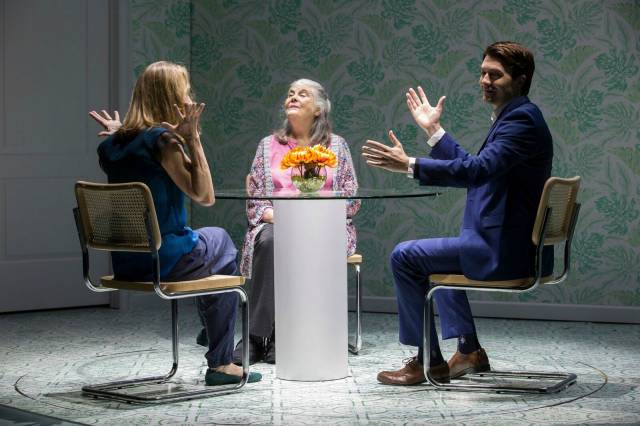

Marjorie Prime begins inside a house filled with modern, streamlined furniture in soft pastels, where we meet 85 year old Marjorie (Lois Smith) as she sits in an older-looking recliner. She’s talking to the handsome Walter (Noah Bean) who is asking her about her lack of appetite. Pulled into the conversation by the charm of the actors, it takes us a moment to realize we haven’t tried to figure out how the characters are related. Then Walter says, “I could tell you about the time we went to the movies”, and proceeds to remind her about the time he proposed. Walter, is a Prime, a holographic version of Marjorie’s late husband meant to keep her company and stimulate her fading memory. According to Marjorie’s daughter (Lisa Emory) and son-in-law (Stephen Root) “Walter Prime” might be the only thing that preserves Marjorie’s memory, and therefore her very essence.
Even though it unfolds like an oneiric mystery, Jordan Harrison’s play is too smart to rely on plot twists or genre conventions to provoke a reaction, instead through elegant language and a chilling use of silences, he ponders on the nature of “being”; are we what we remember, if so, are we allowed endless reinventions? Harrison is one of theatre’s rising stars, over the last decade or so, he’s explored the contrast between the advancement of technology and the loss of simple pleasures in plays like Maple and Wine, and presaged the inevitability of gender blurring in Act A Lady. Marjorie Prime might be his most sublime work to date, as it deals with contemporary anxieties filtered through a classic structure.
I spoke to Harrison about the play’s origins, the demands of working in science fiction, the upcoming film version directed by Michael Almereyda, and how the play touched a very specific chord in me...
My grandmother passed away recently, and you probably won’t believe this but My Best Friend’s Wedding, which your characters mention in the play, was the very first VHS tape she bought me, and we also had this recurring joke about Ingrid Bergman in Casablanca, yet another film referenced in the script.
(Laughs) That’s incredible! You must have had such an eerie experience, like I wrote it just for you.
I won’t deny it was creepy, but it was also extremely moving. It felt like I was receiving a message.
That’s very humbling, thank you…
Was there any particular reason why you ended up using a Julia Roberts film from 1997 as one of the cultural elements in the play?
I guess Marjorie would be my age, she was born in 1977, so in 1997 she would have been like me dewy and young, looking ahead at the rest of my life. It’s also not the sort of movie you would want associated with one of the most important stories from your relationship. There’s something slightly asinine about it (laughs).
Do people come up to you and share personal stories like this often?
Nothing quite as specific as you did, but the other day, after a Friday night performance a woman told me her husband was undergoing treatment for cancer, and her mother had passed away recently. She mentioned the play felt true to her experience, which I guess is the best compliment. I experienced losing my grandmother, but haven’t lost my parents, so when people tell me it felt authentic to them, it’s the highest compliment.

The Primes from the play, by their very nature, help people cope with loss and loneliness. Did you find the process of writing them therapeutic in any way? Would art be your “Prime” so to speak?
I think that’s accurate, yeah. I don’t how much I think about this as I’m writing a first draft, but the things I write about are things I’m obsessing and frustrating and haunting me, and by writing about them I lessen some of that darkness. It makes me think of this Sarah Ruhl line, “happy songs are actually the saddest songs because you put your happiness in the song and leave it behind, and sad songs are actually the happiest songs because inviting them permits you to unload your woes”.
Working with sci-fi is tricky because people expect writers to create entire worlds with unique rules, other than the “Thoughts on the Primes” section in the script, did you come up with a guidebook of rules to help you write about the Primes?
Maybe I’ll start at the beginning to leave no stone unturned, I originally wanted to write the play as a conversation between me and an A.I. program, a chatbot. I would ask them questions as though I was a character and they would respond, and that online conversation would become the text of the play, and you would go and see it performed by two human actors and figure out based on the language alone, which was written by a computer, and which was written by me. The play itself would be a sort of Turing test. I didn’t get very far in this process because the A.I. program kept not understanding, so those little misunderstandings were interesting in themselves to me. The A.I. would say things like “tell me more about your mother”, so those kind of generic phrases they would use to keep the conversation going become in Marjorie Prime how we identify when someone is not actually human.
One of the main cues for directors in the script, is that the Primes should not be performed as robotic, or overly creepy in the way they behave, because Tess and Marjorie and John have to be able to see their loved ones in these Primes. In order to have an emotional connection with the Prime, they need to have enough of the essence of the person they’re programmed to replicate. I didn’t create a guidebook, you’ll see in the script for the most part Primes are referred by their name, because I wrote them as if I was writing the characters.
I have to confess I was being a total teenage boy for a second and wondered if the Primes also fulfill people’s sexual desires, since for the most part they seem to help cope with loneliness.
In the notes you’ll see the Primes are holograms, and because it’s a play they’re played by actors, I like that the “special effect” is an actor. We could’ve done a Princess Leia hologram, but it would’ve only called attention to the fact it’s not human. There’s an uncanny quality to them because they’re played by humans but they’re not humans. I guess they wouldn’t be able to fulfill special needs like sex, but in the first scene when Marjorie is with her husband’s Prime, his goal would be to know everything they did together, even in bed. He’d know where he nibbled on her earlobe or something. I suppose it’s erotic to just converse.
One of the characters gives a clue as to them not being physical, but I’ve heard many people refer to them as robots even though that’s not in the play. I think we’re just used to that convention from old Twilight Zone episodes. It doesn’t bother me if that’s how people experience them, but one of the things Anne Kauffman has done in the staging is to suggest they’re not corporeal.

Woody Allen famously said “I don't want to achieve immortality through my work; I want to achieve immortality through not dying”, and we have someone like Lois Smith whose work on film and recorded theatre in a way makes her immortal. Did you discuss this with her as she prepared for the role?
My conversations with Lois are rarely about her being 85. I don’t know if that’s by my design or hers, but I haven’t found her to be enormously reflective in that way, or sentimental at all. At one point I found this wonderful video on YouTube of her screen test for East of Eden with James Dean, and it’s two magical minutes, so I sent it to her to tease her, because what a thing to have done in your life, and I don’t recall her waxing about it. She lives very much in the present who wants to be thought of as a great actor, and not “an 85 year old actor”. She clearly has a great understanding of what Marjorie is going through, but that’s a thing she’s privately bought to the character. A wonderful paradox she’s brought to the performance is that even though she’s playing someone with dementia, whose mind isn’t always there, and who sometimes has less energy, she manages to be the captain of our experience. She makes the audience feel like they’re in her hands, even if the person she’s playing isn’t always at her best. I have no idea how she pulls that off.
As I saw the play I couldn’t help but think of Jimmy Cavanaugh from Orange is the New Black who similarly ends up living with dementia. Did you at any point write for this character?
I wrote the first draft of the play in 2012 and I didn’t work for the show yet. Jimmy was already gone to who knows where when I came along, I wrote for seasons three and four, and think we saw the last of her in season two. I love that character though, one of the writers on the show, her ringtone is Jimmy saying “Robertaaaa” which is pretty wonderful to hear in the writers’ room.
The cast for the movie version is astonishing, but I’m mostly excited about Michael Almereyda directing it, he’s extremely unsentimental and I think this will work well with the tone of the play.
It’s funny, people ask me why I didn’t adapt the play for film, and simply when Michael told me he had an interest in doing it I had no resistance to that. Sometimes I’ll write a play and think of them as potential TV shows or movies, but in the case of Marjorie Prime, I confess I didn’t see it as a movie. The fact that Michael had this vision of how it could be filmic, made all sense in the world for him to make this adaptation. He has opened it up, and asked my thoughts on the screenplay on several occasions, and he’s been very collaborative.
I’m so amazed by how he’s opened it up in space, the movie will be set in a glass house, where you can see layers of activity even in the room beyond where the scene is set. Each of the characters has a sort of ideographic flashback, which I told him made me think of Cries and Whispers, he hadn’t thought of it that way but it made sense to him. I’ve loved getting to know him, he’s sensitive, dryly funny polymath of a person, every time I see him he brings me a William Eggleston book, or a xerox from Ben Hecht’s autobiography, he’s thoughtful. I don’t know if you know this, but Lois finished shooting the film at 1AM on a Tuesday morning, and at 10AM the same day we had the meet and greet for the first day of rehearsal at Playwrights Horizons.
One of the things that stuck with me the most after seeing the play was how you deal with the philosophical/spiritual dilemma on whether people continue being themselves after their memories are gone. There are moments in the play that lend themselves to be interpreted as spiritual visions of heaven for instance, and others that tend to be much more pragmatic. Were you in any way interested in achieving some sort of compromise between spirituality and the advancement of technology?
I wouldn’t call myself a very spiritual person, but I love your read. I don’t think people are comfortable with the idea of humans not being around forever, and I like ambiguity onstage, I was interested in the idea that the Primes captured a part of who people were, not just who they really were, but also things they might have lost at some point. Alex Garland who wrote and directed Ex-Machina, had an op-ed in The Times over the summer, about how great thinkers of our time like Stephen Hawking were saying nuclear war wouldn’t end the human race, but artificial intelligence would, so Garland put a more hopeful spin on it, by saying that A.I. would remember the best of us. A friend also pointed out to me that the Primes do something humans tend to do as well, in our effort to create our self, there are things we selectively forget, or gloss over. It’s creepy, but also hopeful.
Marjorie Prime is playing through January 24 at Playwrights Horizons.